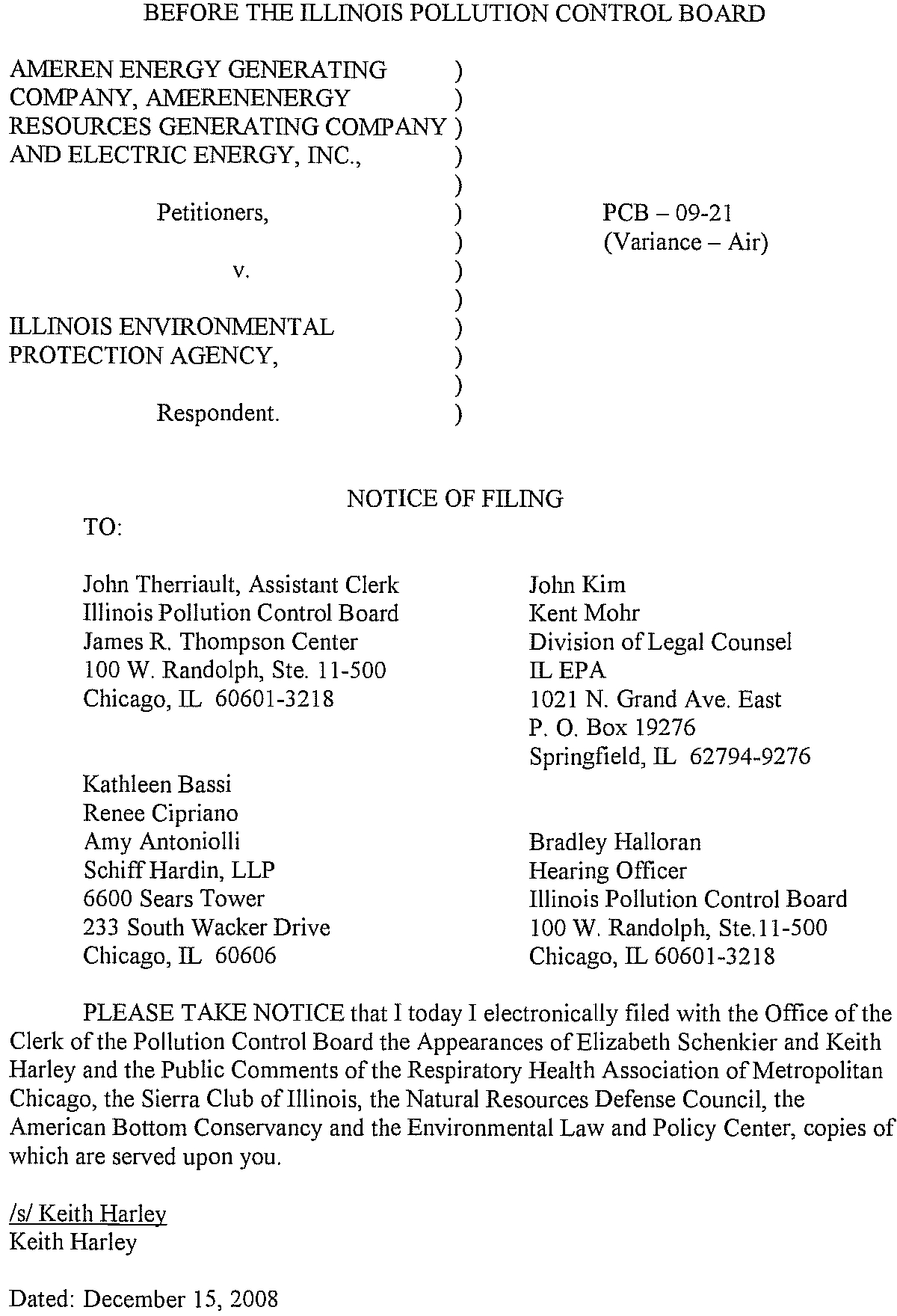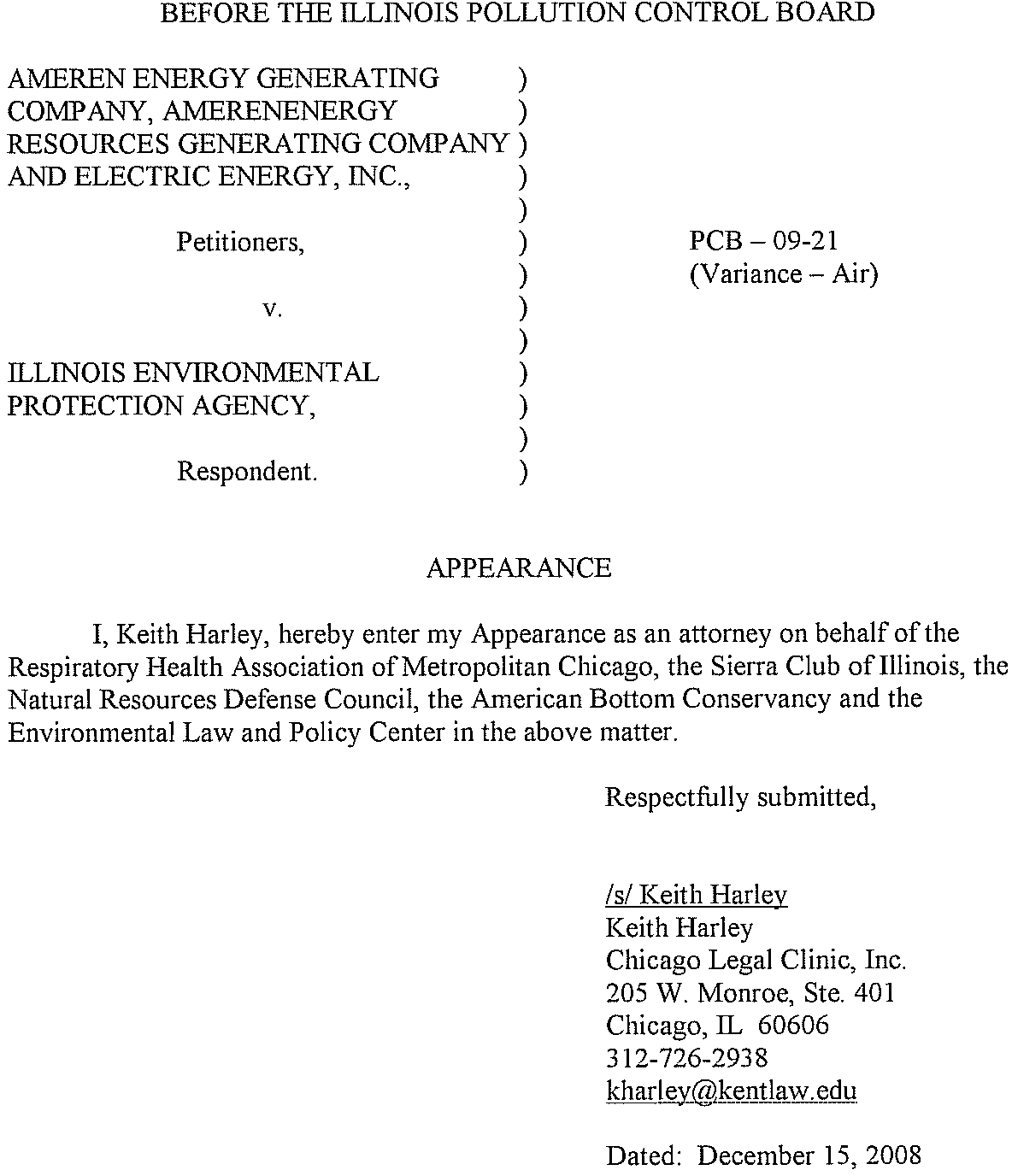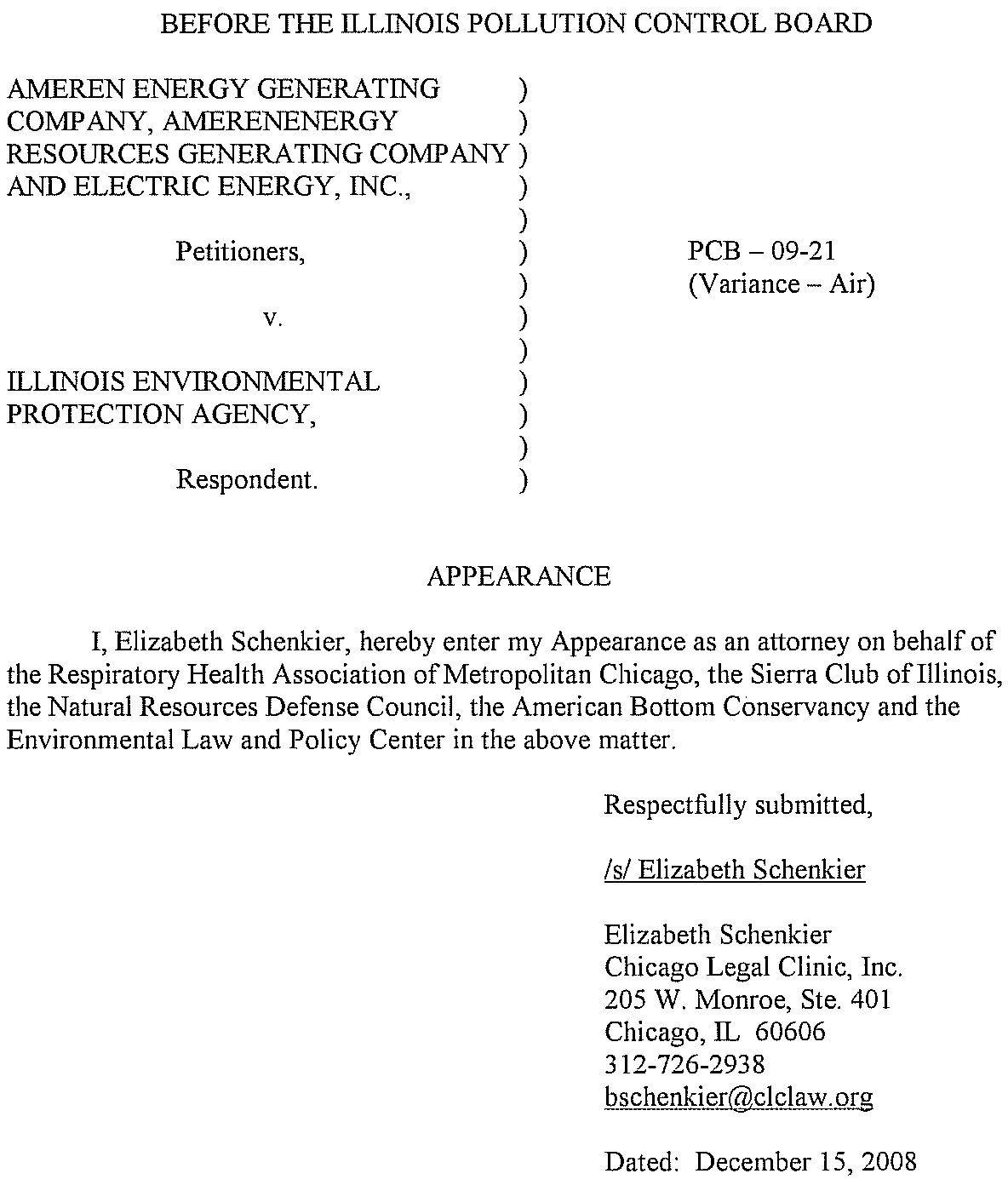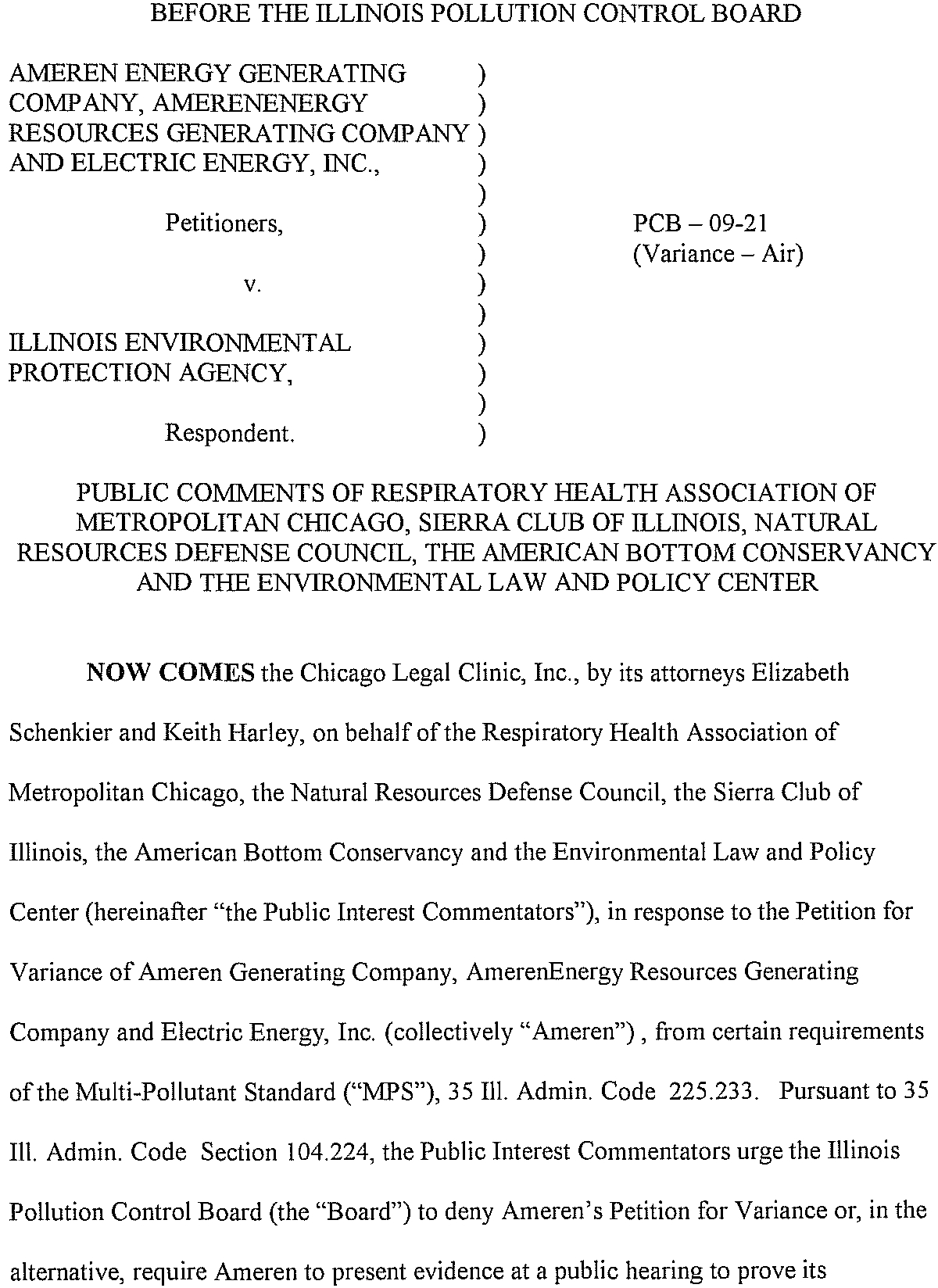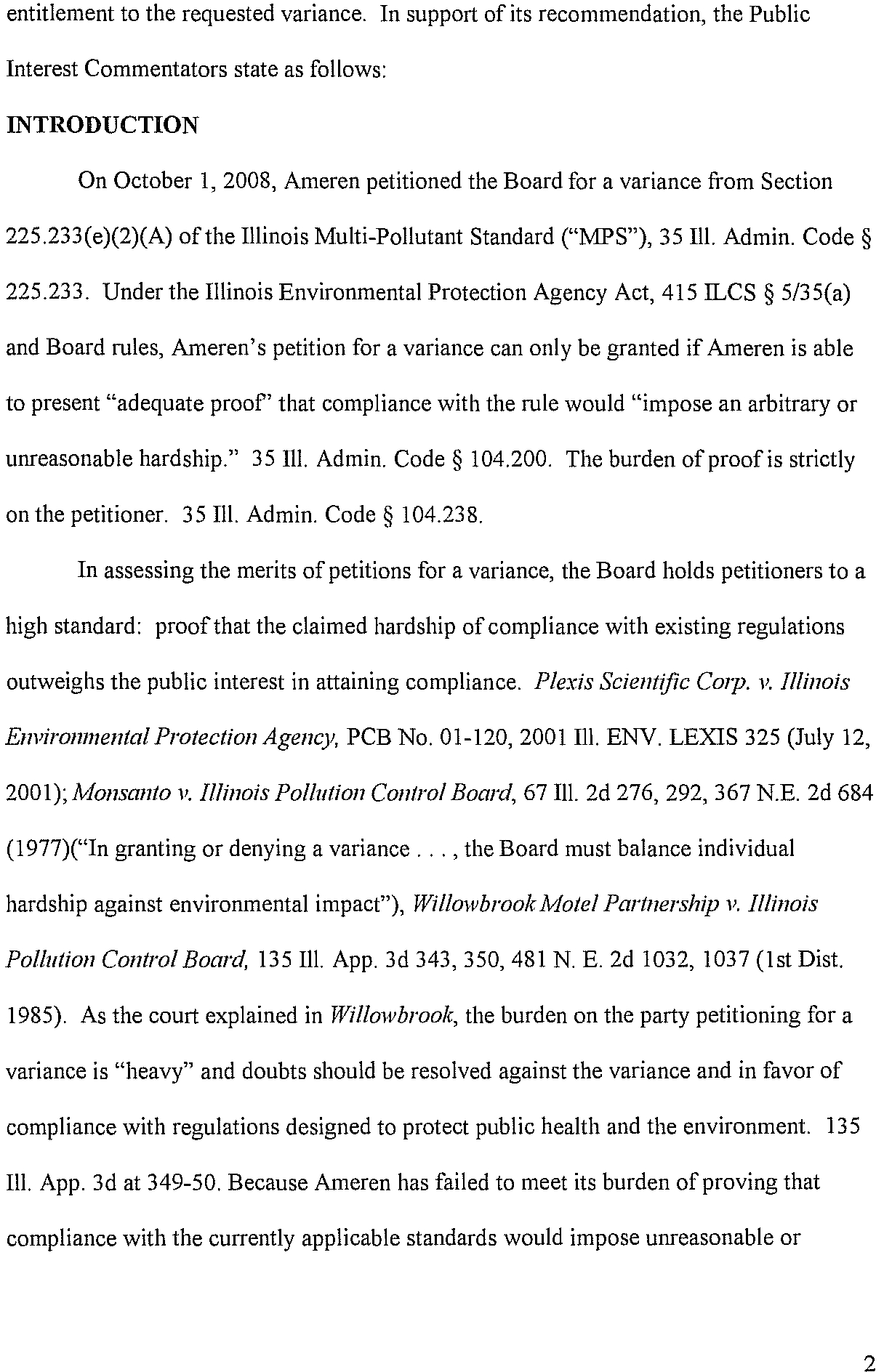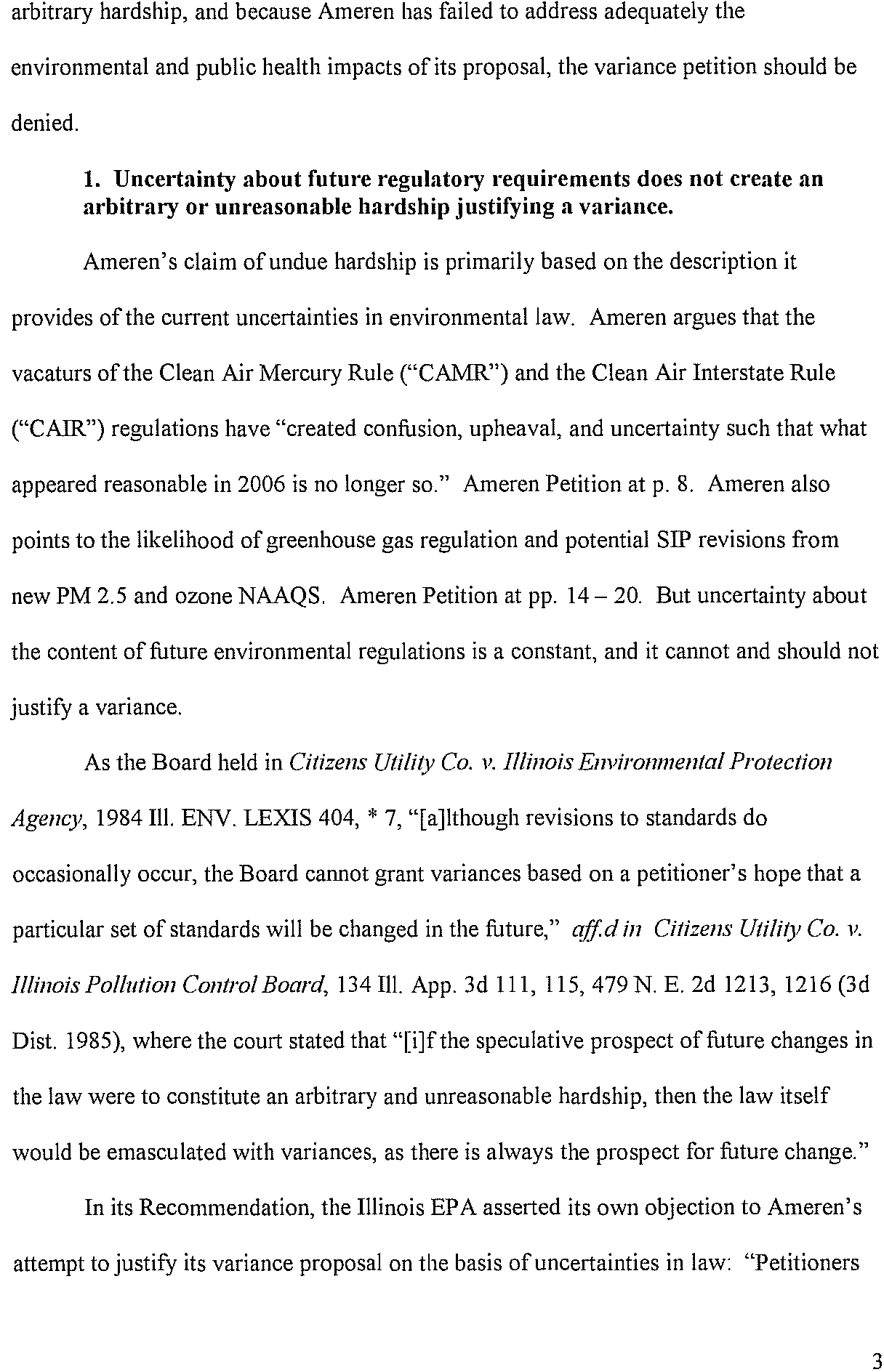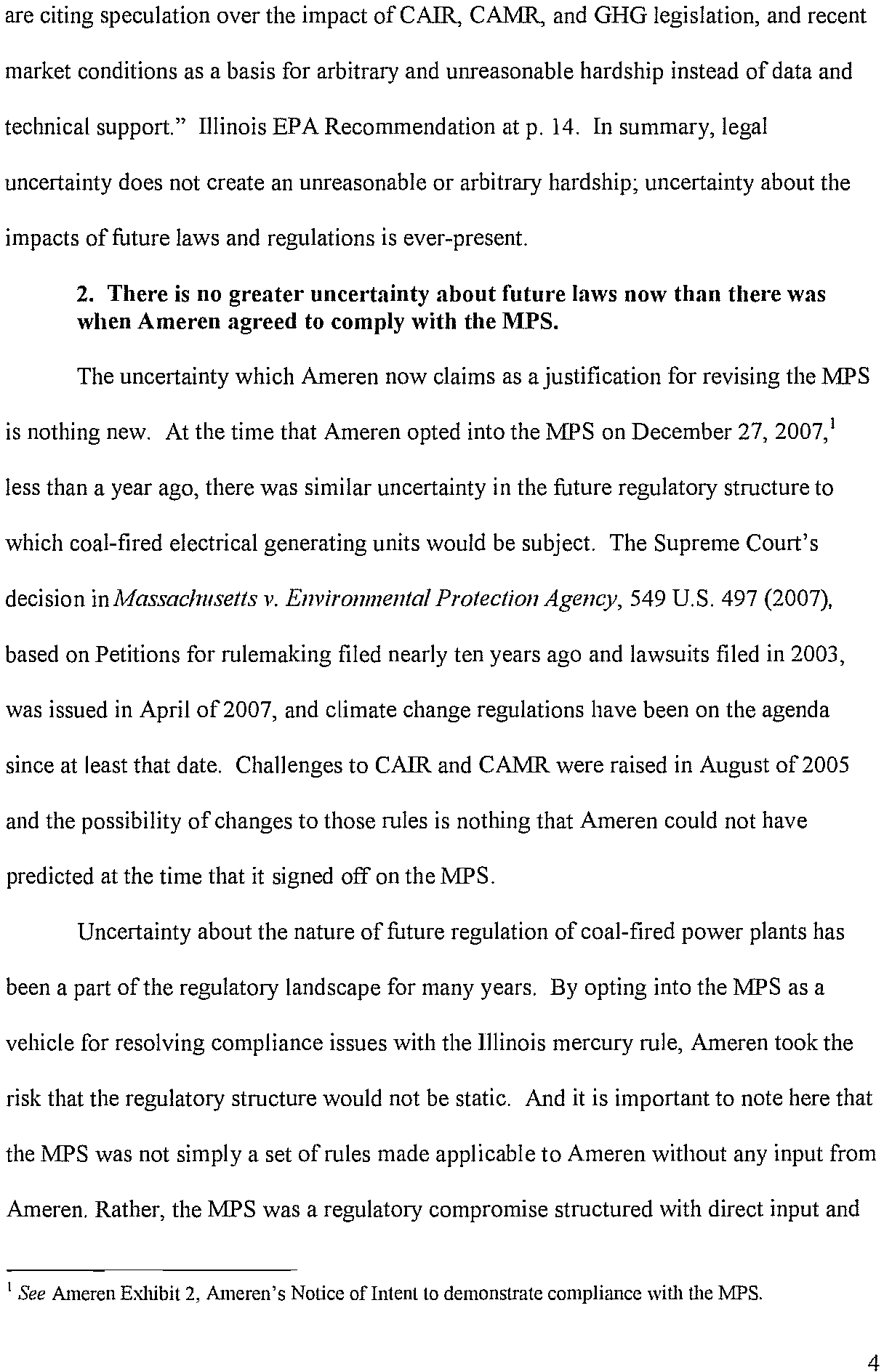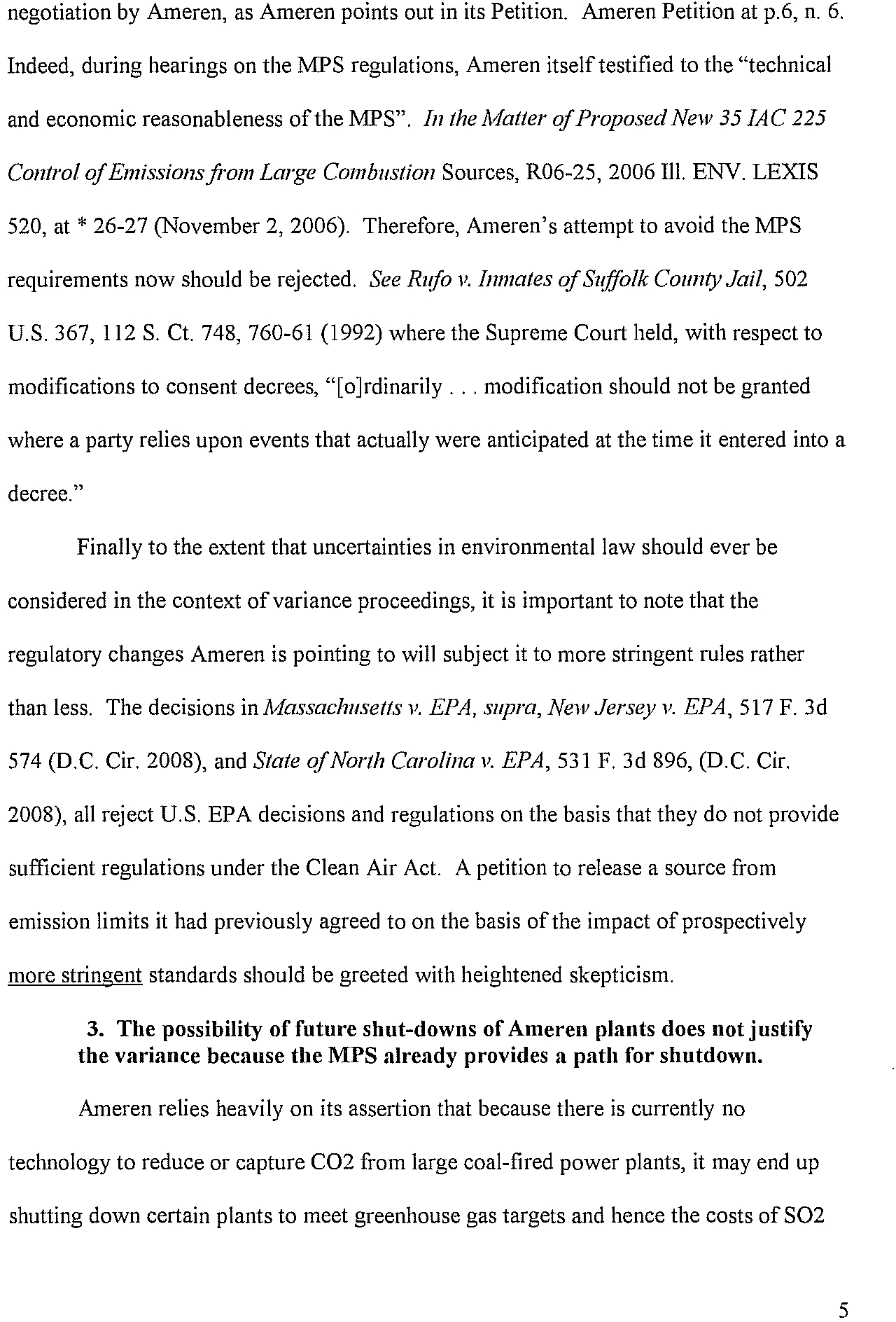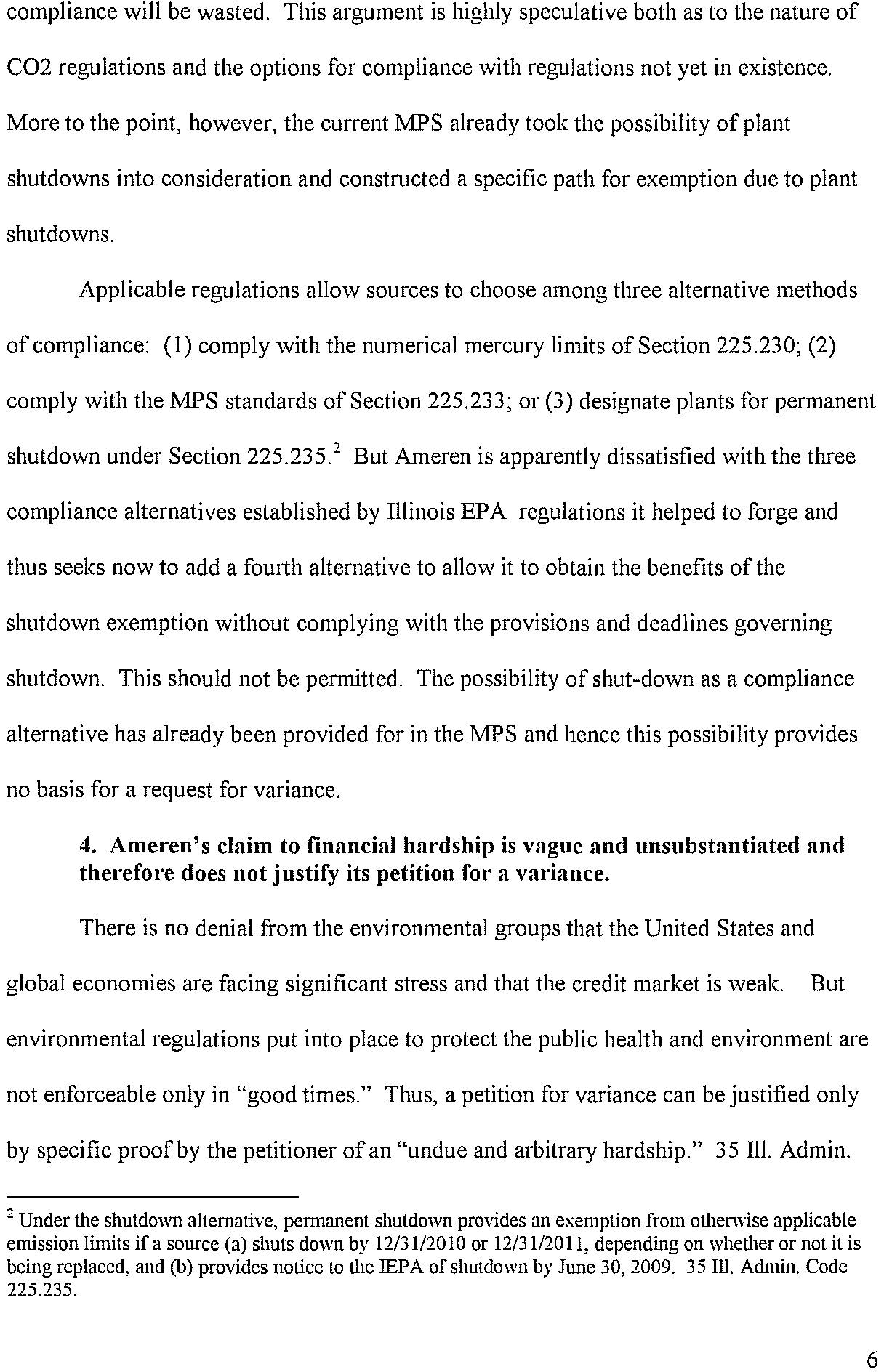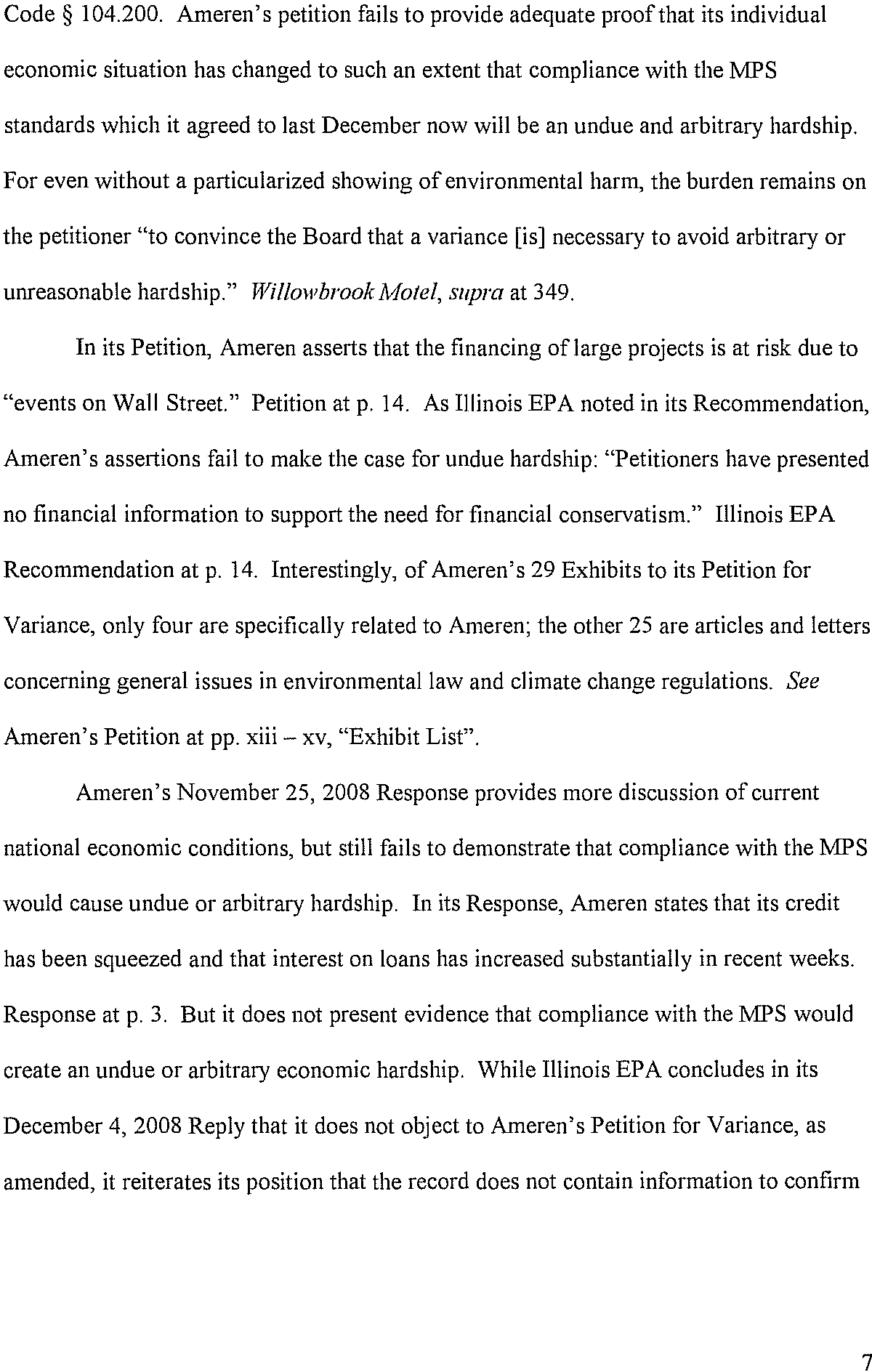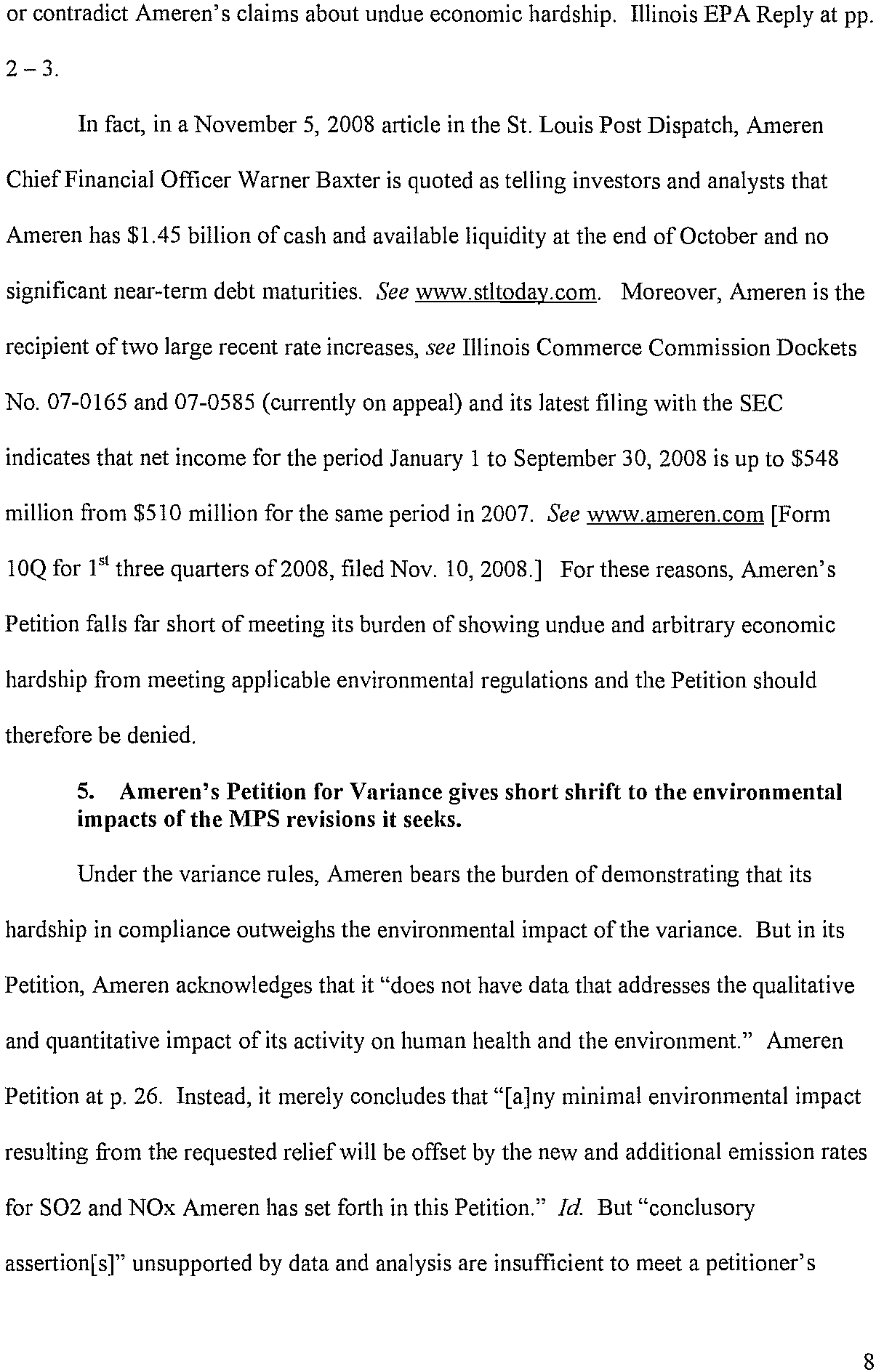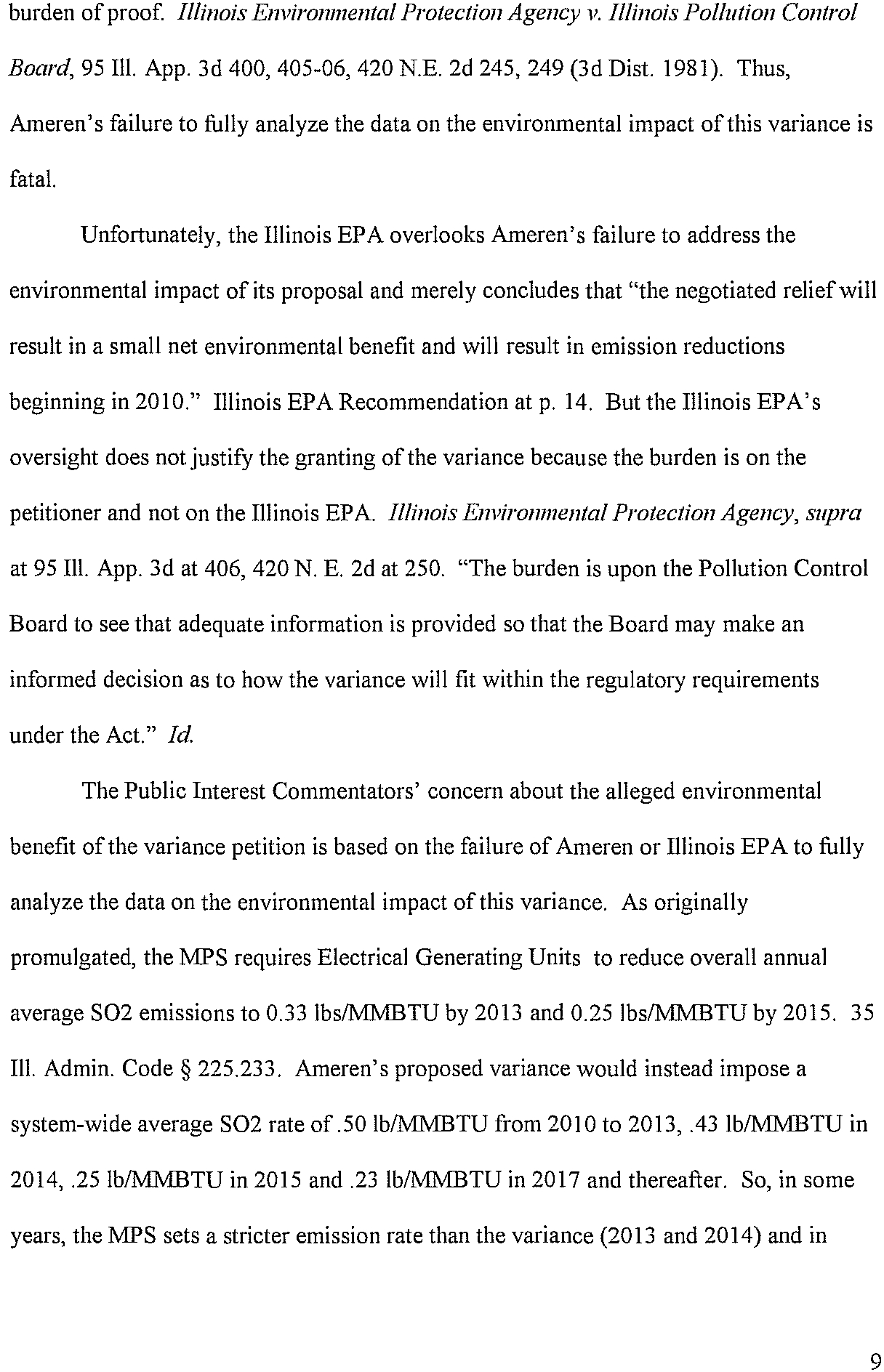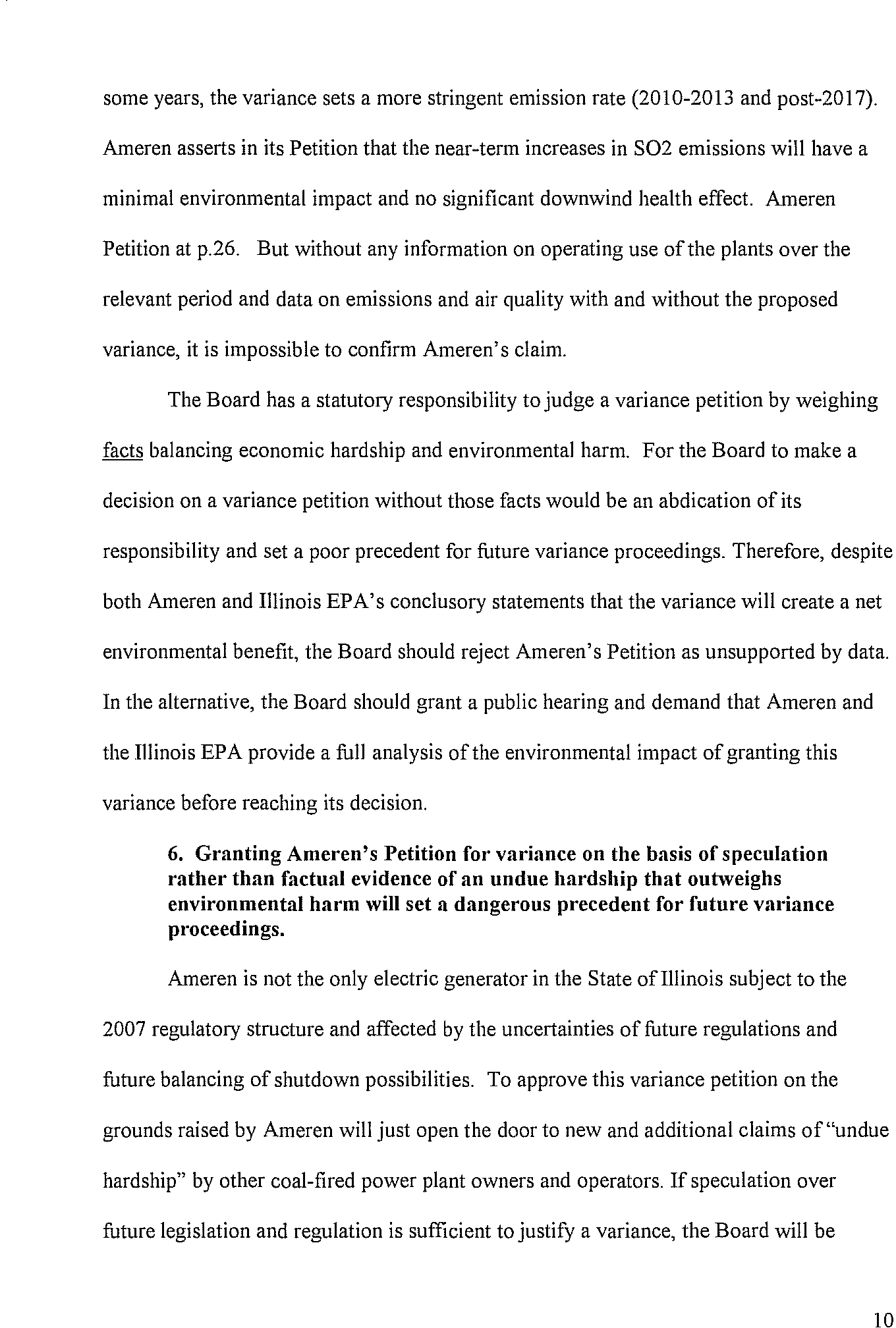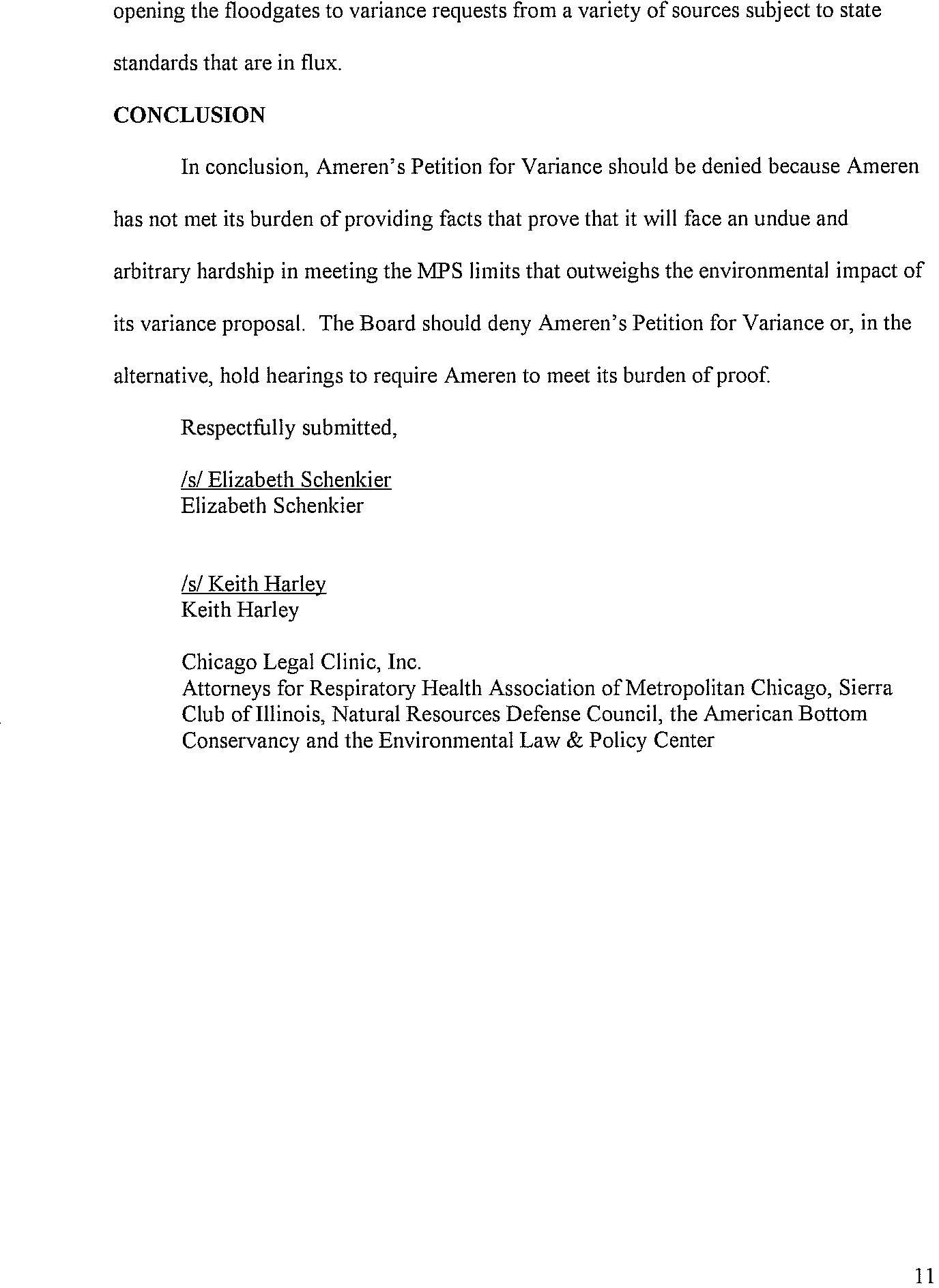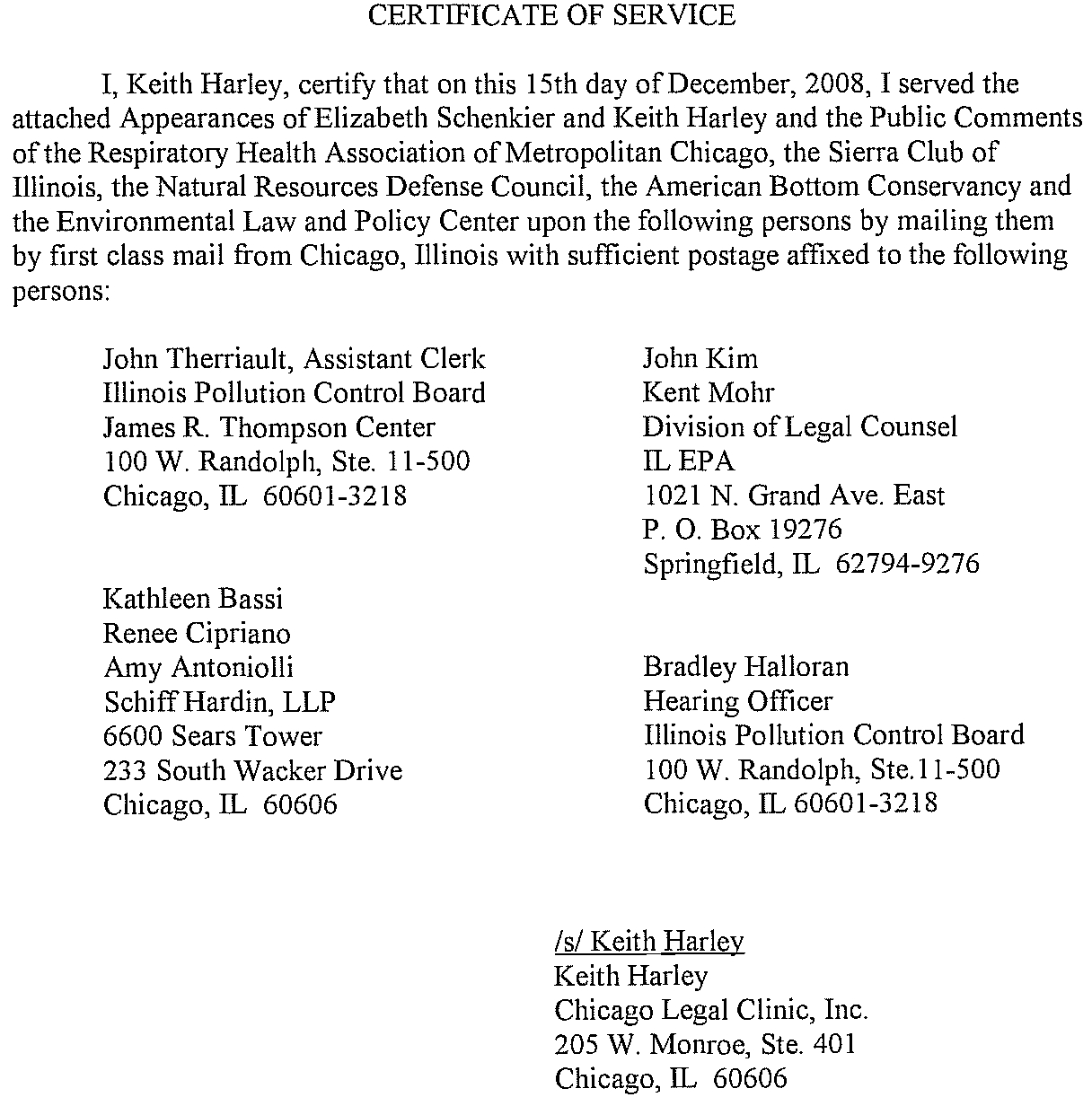BEFORE THE ILLINOIS POLLUTION CONTROL BOARD
v.
Petitioners,
Respondent.
ILLINOIS ENVIRONMENTAL
PROTECTION AGENCY,
PCB - 09-21
(Variance - Air)
AMEREN ENERGY GENERATING
)
COMPANY, AMERENENERGY
)
RESOURCES GENERATING COMPANY)
AND ELECTRIC ENERGY, INC.,
)
)
)
)
)
)
)
)
)
)
NOTICE OF FILING
TO:
John Therriault, Assistant Clerk
Illinois Pollution Control Board
James
R.
Thompson Center
100
W. Randolph, Ste. 11-500
Chicago, IL 60601-3218
Kathleen Bassi
Renee Cipriano
Amy Antoniolli
SchiffHardin, LLP
6600 Sears Tower
233 South Wacker Drive
Chicago, IL 60606
101m
Kim
Kent Mohr
Division
of Legal Counsel
ILEPA
1021 N. Grand Ave. East
P. O. Box 19276
Springfield, IL 62794-9276
Bradley Halloran
Hearing Officer
Illinois Pollution Control Board
100
W.
Randolph, Ste.11-500
Chicago, IL 60601-3218
PLEASE TAKE NOTICE that 1 today I electronically filed with the Office
of the
Clerk
of the Pollution Control Board the Appearances ofElizabeth Schenkier and Keith
Harley and the Public Comments
of the Respiratory Health Association ofMetropolitan
Chicago, the Sierra Club ofIllinois, the Natural Resources Defense Council, the
American Bottom Conservancy and the Environmental Law and Policy Center, copies
of
which are served upon you.
/s/ Keith Harley
Keith Harley
Dated: December
15, 2008
Electronic Filing - Received, Clerk's Office, December 15, 2008
BEFORE THE ILLINOIS POLLUTION CONTROL BOARD
v.
Petitioners,
Respondent.
AMEREN
ENERGY GENERATING
PCB
-09-21
(Variance - Air)
ILLINOIS ENVlRONMENTAL
PROTECTION AGENCY,
)
COMPANY, AMERENENERGY
)
RESOURCES GENERATING
COMPANY)
AND ELECTRIC ENERGY, INC.,
)
)
)
)
)
)
)
)
)
)
APPEARANCE
I, Keith Harley, hereby enter my Appearance as
an attorney on behalf of the
Respiratory Health Association
ofMetropolitan Chicago, the Sierra Club of Illinois, the
Natural Resources Defense Council, the American Bottom Conservancy and the
Environmental
Law and Policy Center in the above matter.
Respectfully submitted,
lsi
Keith Harley
Keith Harley
Chicago Legal Clinic, Inc.
205
W. Monroe, Ste. 401
Chicago,
IL 60606
312-726-2938
kharl\~y@k~}lt1i].W.\)du
Dated: December 15, 2008
Electronic Filing - Received, Clerk's Office, December 15, 2008
BEFORE THE ILLINOIS POLLUTION CONTROL BOARD
v.
Petitioners,
Respondent.
AMEREN ENERGY GENERATING
PCB - 09-21
(Variance - Air)
)
COMPANY, AMERENENERGY
)
RESOURCES GENERATING
COMPANY)
AND ELECTRIC ENERGY, INC.,
)
)
)
)
)
)
)
)
)
)
ILLINOIS ENVIRONMENTAL
PROTECTION AGENCY,
APPEARANCE
I,
Elizabeth Schenkier, hereby enter my Appearance as an attorney on behalf of
the Respiratory Health Association ofMetropolitan Chicago, the Sierra Club ofIllinois,
the Natural Resources Defense Council, the American Bottom Conservancy and the
Environmental Law and Policy Center
in the above matter.
Respectfully submitted,
/s/ Elizabeth Schenkier
Elizabeth Schenkier
Chicago Legal Clinic, Inc.
205
W. Monroe, Ste. 401
Chicago, IL 60606
312-726-2938
!n\<h~I).J,i~I@dgaw
.
.Qrg
Dated: December 15, 2008
Electronic Filing - Received, Clerk's Office, December 15, 2008
BEFORE THE ILLINOIS POLLUTION CONTROL BOARD
v.
Petitioners,
Respondent.
AMEREN ENERGY GENERATING
PCB -09-21
(Variance - Air)
ILLINOIS ENVIRONMENTAL
PROTECTION AGENCY,
)
COMPANY, AMERENENERGY
)
RESOURCES GENERATING
COMPANY)
AND ELECTRIC ENERGY, INC.,
)
)
)
)
)
)
)
)
)
)
PUBLIC COMMENTS OF RESPIRATORY HEALTH ASSOCIATION OF
METROPOLITAN CHICAGO, SIERRA CLUB
OF ILLINOIS, NATURAL
RESOURCES DEFENSE COUNCIL, THE AMERICAN BOTTOM CONSERVANCY
AND THE ENVIRONMENTAL LAW AND POLICY CENTER
NOW COMES
the Chicago Legal Clinic, Inc., by its attorneys Elizabeth
Schenkier and Keith Harley, on behalf
ofthe Respiratory Health Association of
Metropolitan Chicago, the Natural Resources Defense Council, the Sierra Club of
Illinois, the American Bottom Conservancy and the Environmental Law and Policy
Center (hereinafter "the Public Interest Commentators"), in response to the Petition for
Variance
of Ameren Generating Company, AmerenEnergy Resources Generating
Company and Electric Energy, Inc. (collectively "Ameren"), from certain requirements
ofthe Multi-Pollutant Standard ("MPS"), 35 Ill. Admin. Code 225.233. Pursuant to 35
Ill. Admin. Code Section 1
04.224, the Public Interest Commentators urge the Illinois
Pollution Control Board (the "Board") to deny Ameren'sPetition for Variance or,
in the
alternative, require Ameren to present evidence at a public hearing to prove its
Electronic Filing - Received, Clerk's Office, December 15, 2008
entitlement to the requested variance. In support of its recommendation, the Public
Interest Commentators state
as follows:
INTRODUCTION
On October
1, 2008, Ameren petitioned the Board for a variance from Section
225.233(e)(2)(A)
of the Illinois Multi-Pollutant Standard ("MPS"), 35
Ill.
Admin. Code §
225.233. Under the Illinois Environmental Protection Agency Act, 415 ILCS § 5/35(a)
and Board rules, Ameren's petition for a variance can only be granted
if Ameren is able
to present "adequate proof" that compliance with the rule would "impose an arbitrary or
unreasonable hardship."
35
Ill.
Admin. Code § 104.200. The burden of proof is strictly
on the petitioner. 35
Ill.
Admin. Code § 104.238.
In assessing the merits
of petitions for a variance, the Board holds petitioners to a
high standard:
proofthat the claimed hardship of compliance with existing regulations
outweighs the public interest
in attaining compliance.
Plexis Scientific CO/po v. Illinois
Environmental Protection Agency,
PCB No. 01-120, 2001
Ill.
ENV. LEXIS 325 (July 12,
2001);
Monsanto v. Illinois Pollution Control Board,
67 Ill. 2d 276,292,367 N.E. 2d 684
(l977)("In granting
or denying a variance ... , the Board must balance individual
hardship against environmental impact"),
Willowbrook Motel Partnership v. Illinois
Pollution Control Board,
135 Ill. App. 3d 343, 350, 481 N. E. 2d 1032, 1037 (lst Dist.
1985).
As the court explained in
Willowbrook,
the burden on the party petitioning for a
variance
is "heavy" and doubts should be resolved against the variance and in favor of
compliance with regulations designed to protect public health and the environment. 135
Ill. App. 3d at 349-50. Because Ameren has failed to meet its burden of proving that
compliance with the currently applicable standards would impose unreasonable
or
2
Electronic Filing - Received, Clerk's Office, December 15, 2008
arbitrary hardship, and because Ameren has failed to address adequately the
environmental and public health impacts
of its proposal, the variance petition should be
denied.
1. Uncertainty about future regulatory l'equirements
does
not create an
arbitrary
or unreasonable hal'dship justifying a variance.
Ameren's claim of undue hardship is primarily based on the description it
provides
of the current uncertainties in environmental law. Ameren argues that the
vacaturs
ofthe Clean Air Mercury Rule ("CAMR") and the Clean Air Interstate Rule
("CAIR") regulations have "created confusion, upheaval, and uncertainty such that what
appeared reasonable
in 2006 is no longer so." Ameren Petition at p. 8. Ameren also
points to the likelihood
of greenhouse gas regulation and potential SIP revisions from
new PM 2.5 and ozone NAAQS, Ameren Petition at
pp. 14 - 20. But uncertainty about
the content
of future environmental regulations is a constant, and it cannot and should not
justify a variance.
As the Board held in
Citizens Utility Co. v. Illinois Environmental Protection
Agency,
1984
Ill.
ENV. LEXIS 404,
*
7, "[a]lthough revisions to standards do
occasionally occur, the Board cannot grant variances based on a petitioner's hope that a
particular set
of standards will be changed in the future,"
a.ff.d in Citizens Utility Co. v.
Illinois Pollution Control Board,
134 Ill. App. 3d 111, 115,479 N. E. 2d 1213, 1216 (3d
Dist. 1985), where the court stated that
"[i]fthe speculative prospect of future changes in
the law were to constitute an arbitrary and unreasonable hardship, then the law itself
would be emasculated with variances,
as there is always the prospect for future change."
In its Recommendation, the Illinois
EPA asserted its own objection to Ameren's
attempt to justify its variance proposal on the basis
of uncertainties in law: "Petitioners
3
Electronic Filing - Received, Clerk's Office, December 15, 2008
are citing speculation over the impact of CAIR, CAMR, and GHG legislation, and recent
market conditions as a basis for arbitrary and unreasonable hardship instead
of data and
technical support." Illinois
EPA Recommendation at p. 14. In summary, legal
uncertainty does not create
an unreasonable or arbitrary hardship; uncertainty about the
impacts
of future laws and regulations is ever-present.
2. There is no greater uncel"tainty about future laws now than thel'ewas
when
Ameren agreed to comply with the MPS.
The uncertainty which Ameren now claims
as a justification for revising the MPS
is nothing new. At the time that Ameren opted into the MPS on December 27, 2007,1
less than a year ago, there was similar uncertainty in the future regulatory structure to
which coal-fired electrical generating units would be subject. The Supreme Court's
decision
in
Massachusetts v. Environmental Protection Agency,
549 U.S. 497 (2007),
based on Petitions for rulemaking filed nearly ten years ago and lawsuits filed in 2003,
was issued
in April of2007, and climate change regulations have been on the agenda
since at least that date. Challenges to CAIR and CAMR were raised in August
of2005
and the possibility of changes to those rules is nothing that Ameren could not have
predicted at the time that
it signed off on the MPS.
Uncertainty about the nature
of future regulation of coal-fired power plants has
been a part
of the regulatory landscape for many years. By opting into the MPS as a
vehicle for resolving compliance issues with the Illinois mercury rule, Ameren took the
risk that the regulatory structure would not be static. And
it is important to note here that
the MPS was not simply a set
of rules made applicable to Ameren without any input from
Ameren. Rather, the MPS was a regulatory compromise structured with direct input and
1
See
Ameren Exhibit 2, Ameren'sNotice ofIntent to demonstrate compliance witil tile MPS.
4
Electronic Filing - Received, Clerk's Office, December 15, 2008
negotiation by Ameren, as Ameren points out in its Petition. Ameren Petition at p.6, n. 6.
Indeed, during hearings on the MPS regulations, Ameren itself testified to the "technical
and economic reasonableness
ofthe MPS".
In the Matter ofProposed New
35
lAC 225
Control
ofEmissionsfrom Large Combustion
Sources, R06-25, 2006
Ill.
ENV. LEXIS
520, at
*
26-27 (November 2,2006). Therefore, Ameren's attempt to avoid the MPS
requirements now should be rejected.
See Rl!fo
v. Inmates ofSuffolk County Jail, 502
U.S. 367, 112
S. Ct. 748, 760-61 (1992) where the Supreme Court held, with respect to
modifications to consent decrees,
"[0]rdinarily ... modification should not be granted
where a party relies upon events that actually were anticipated
at the time it entered into a
decree."
Finally to the extent that uncertainties
in environmental law should ever be
considered in the context
of variance proceedings, it is important to note that the
regulatory changes Ameren is pointing to will subject
it to more stringent rules rather
than less. The decisions in
Massachusetts
v. EPA, supra, New Jersey v. EPA,
517 F. 3d
574 (D.C. Cir. 2008), and
State
ofNorth Carolina v. EPA,
531 F. 3d 896, (D.C. Cir.
2008), all reject U.S. EPA decisions and regulations on the basis that they do not provide
sufficient regulations under the Clean Air Act. A petition to release a source from
emission limits
it had previously agreed to on the basis ofthe impact of prospectively
more stringent standards should be greeted with heightened skepticism.
3. The possibility offuture shut-downs of Ameren plants does not justify
the variance because
the MPS already provides a path for shutdown.
Ameren relies heavily on its assertion that because there is currently no
teclmology to reduce or capture
C02 from large coal-fired power plants, it may end up
shutting down certain plants to meet greenhouse gas targets and hence the costs
of S02
5
Electronic Filing - Received, Clerk's Office, December 15, 2008
compliance will be wasted. This argument is highly speculative both as to the nature of
C02 regulations and the options for compliance with regulations not yet in existence.
More to the point, however, the current MPS already took the possibility
of plant
shutdowns into consideration and constructed a specific path for exemption due to plant
shutdowns.
Applicable regulations allow sources to choose among three alternative methods
of compliance: (1) comply with the numerical mercury limits of Section 225.230; (2)
comply with the
MPS standards of Section 225.233; or (3) designate plants for permanent
shutdown under Section 225.235
2
But Ameren is apparently dissatisfied with the three
compliance alternatives established by Illinois
EPA regulations it helped to forge and
thus seeks now
to add a fourth alternative to allow it to obtain the benefits of the
shutdown exemption without complying with the provisions and deadlines governing
shutdown. This should not be permitted. The possibility
of shut-down as a compliance
alternative has already been provided for in the MPS and hence this possibility provides
no basis for a request for variance.
4.
Ameren's
claim to financial hardship is vague and unsubstantiated and
therefore
does
not justify its petition for a variance.
There is no denial from the environmental groups that the United States and
global economies are facing significant stress and that the credit market
is weak. But
environmental regulations put into place to protect the public health and environment are
not enforceable only in
"good times." Thus, a petition for variance can be justified only
by specific
proof by the petitioner of an "undue and arbitrary hardship." 35
Ill.
Admin.
2 Under the shutdown alternative, pennaneut shutdown provides an exemption from oU,erwise applicable
emission limits
if a source (a) shuts down by 12/3112010 or
12/3112011,
depending on wheU,er or not it is
being replaced, and
(b) provides notice to U,e !EPA of shutdown by June 30, 2009. 35 III. Admin. Code
225.235.
6
Electronic Filing - Received, Clerk's Office, December 15, 2008
Code § 104.200. Ameren's petition fails to provide adequate proofthat its individual
economic situation has changed to such an extent that compliance with the MPS
standards which
it agreed to last December now will be an undue and arbitrary hardship.
For even without a particularized showing
of environmental harm, the burden remains on
the petitioner "to convince the Board that a variance [is] necessary to avoid arbitrary
or
unreasonable hardship."
Willowbrook Motel, supra
at 349.
In its Petition, Ameren asserts that the financing oflarge projects
is at risk due to
"events on Wall Street." Petition at
p. 14. As Illinois EPA noted in its Recommendation,
Ameren's assertions fail to make the case for undue hardship: "Petitioners have presented
no financial information to support the need for financial conservatism." Illinois EPA
Recommendation at
p. 14. Interestingly, of Ameren's 29 Exhibits to its Petition for
Variance, only four are specifically related to Ameren; the other
25 are articles and letters
concerning general issues
in environmental law and climate change regulations.
See
Ameren'sPetition at pp. xiii - xv, "Exhibit List".
Ameren'sNovember 25, 2008 Response provides more discussion
of current
national economic conditions, but still fails to demonstrate that compliance with the MPS
would cause undue
or arbitrary hardship. In its Response, Ameren states that its credit
has been squeezed and that interest on loans has increased substantially in recent weeks.
Response at
p. 3. But it does not present evidence that compliance with the MPS would
create an undue
or arbitrary economic hardship. While Illinois EPA concludes in its
December
4,2008 Reply that it does not object to Ameren'sPetition for Variance, as
amended,
it reiterates its position that the record does not contain information to confirm
7
Electronic Filing - Received, Clerk's Office, December 15, 2008
or contradict Ameren'sclaims about undue economic hardship. Illinois EPA Reply at pp.
2 -3.
In fact, in a November 5, 2008 article in the St. Louis Post Dispatch, Ameren
ChiefFinancial Officer Warner Baxter is quoted as telling investors and analysts that
Ameren has $1.45 billion
of cash and available liquidity at the end of October and no
significant near-term debt maturities.
See
www.stltoday.com. Moreover, Ameren is the
recipient
of two large recent rate increases,
see
Illinois Commerce Commission Dockets
No. 07-0165 and 07-0585 (currently on appeal) and its latest filing with the SEC
indicates that net income for the period January 1 to September 30, 2008 is up to $548
million from $510 million for the same period in 2007.
See
www.ameren.com [Form
10Q for IS! three quarters of2008, filed Nov. 10,2008.] For these reasons, Ameren's
Petition falls far short
of meeting its burden of showing undue and arbitrary economic
hardship from meeting applicable environmental regulations and the Petition should
therefore be denied.
5. Ame.oen's
Petition for Variance gives short shrift to the environmental
impacts of the MPS revisions it seel{s.
Under the variance rules, Ameren bears the burden of demonstrating that its
hardship in compliance outweighs the environmental impact
ofthe variance. But in its
Petition, Ameren acknowledges that it "does not have data that addresses the qualitative
and quantitative impact of its activity on human health and the environment." Ameren
Petition at
p. 26. Instead, it merely concludes that "[a]ny minimal environmental impact
resulting from the requested relief will be offset
by the new and additional emission rates
for S02 and NOx Ameren has set forth in this Petition."
Jd.
But "conclusory
assertion[s]" unsupported by data and analysis are insufficient to meet a petitioner's
8
Electronic Filing - Received, Clerk's Office, December 15, 2008
burden of proof.
Illinois Environmental Protection Agency v. Illinois Pollution Control
Board,
95
Ill.
App. 3d 400, 405-06, 420 N.B. 2d 245,249 (3d Dist. 1981). Thus,
Ameren's failure to fully analyze the data on the environmental impact
ofthis variance is
fatal.
Unfortunately, the Illinois
EPA overlooks Ameren's failure to address the
environmental impact
of its proposal and merely concludes that "the negotiated reliefwill
result in a small net environmental benefit and will result in emission reductions
beginning in 2010." Illinois
EPA Recommendation at p. 14. But the Illinois EPA's
oversight does not justify the granting of the variance because the burden is on the
petitioner and not on the Illinois EPA.
Illinois Environmental Protection Agency, supra
at 95 Ill. App. 3d at 406, 420 N. E. 2d at 250. "The burden is upon the Pollution Control
Board to see that adequate information
is provided so that the Board may make an
informed decision as
to how the variance will fit within the regulatory requirements
under the Act."
Id.
The Public Interest Commentators' concern about the alleged environmental
benefit
of the variance petition is based on the failure of Ameren or Illinois EPA to fully
analyze the data on the environmental impact
of this variance. As originally
promulgated, the MPS requires Electrical Generating Units to reduce overall annual
average
S02 emissions to 0.33 IbslMMBTU by 2013 and 0.25 IbslMMBTU by 2015. 35
Ill.
Admin. Code § 225.233. Ameren's proposed variance would instead impose a
system-wide average
S02 rate of .50 IblMMBTU from 2010 to 2013, .43 IblMMBTU in
2014, .25 IblMMBTU in 20
IS and .23 lb/MMBTU in 2017 and thereafter. So, in some
years, the MPS sets a stricter emission rate than the variance (2013 and 2014) and in
9
Electronic Filing - Received, Clerk's Office, December 15, 2008
some years, the variance sets a more stringent emission rate (2010-2013 and post-2017).
Ameren asserts
in its Petition that the near-term increases in S02 emissions will have a
minimal environmental impact and no significant downwind health effect. Ameren
Petition at p.26. But without any information on operating use
of the plants over the
relevant period and data on emissions and air quality with and without the proposed
variance,
it is impossible to confirm Ameren'sclaim.
The Board has a statutory responsibility to judge a variance petition by weighing
facts balancing economic hardship and environmental harm.
For the Board to make a
decision on a variance petition without those facts would be an abdication
of its
responsibility and set a poor precedent for future variance proceedings. Therefore, despite
both Ameren and Illinois
EPA's conclusory statements that the variance will create a net
environmental benefit, the Board should reject Ameren's Petition as unsupported by data.
In the alternative, the Board should grant a public hearing and demand that Ameren and
the Illinois EPA provide a full analysis
of the environmental impact of granting this
variance before reaching its decision.
6. Granting Ameren's Petition for variance on the basis of speculation
rather than factual evidence
of an undue hardship that outweighs
environmental harm will
set a
dangerous precedent for future vm'iance
proceedings.
Ameren is not the only electric generator in the State ofIllinois subject to the
2007 regulatory structure and affected by the uncertainties
of future regulations and
future balancing
of shutdown possibilities. To approve this variance petition on the
grounds raised by Ameren will just open the door to new and additional claims
of "undue
hardship" by other coal-fired power plant owners and operators.
If speculation over
future legislation and regulation is sufficient to justify a variance, the Board will be
10
Electronic Filing - Received, Clerk's Office, December 15, 2008
opening the floodgates to variance requests from a variety of sources subj ect to state
standards that are in flux.
CONCLUSION
In conclusion, Ameren's Petition for Variance should be denied because Ameren
has not met its burden
of providing facts that prove that it will face an undue and
arbitrary hardship
in meeting the MPS limits that outweighs the environmental impact of
its variance proposal. The Board should deny Ameren'sPetition for Variance or, in the
alternative, hold hearings to require Ameren to meet its burden
of proof.
Respectfully submitted,
/s/ Elizabeth Schenkier
Elizabeth Schenkier
/s/ Keith Harley
Keith Harley
Chicago Legal Clinic, Inc.
Attorneys for Respiratory Health Association
of Metropolitan Chicago, Sierra
Club
of Illinois, Natural Resources Defense Council, the American Bottom
Conservancy and the Environmental Law
&
Policy Center
11
Electronic Filing - Received, Clerk's Office, December 15, 2008
CERTIFICATE OF SERVICE
I, Keith Harley, certify that on this 15th day
of December, 2008, I served the
attached Appearances
ofElizabeth Schenkier and Keith Harley and the Public Comments
ofthe Respiratory Health Association of Metropolitan Chicago, the Sierra Club of
Illinois, the Natural Resources Defense Council, the American Bottom Conservancy and
the Environmental Law and Policy Center upon the following persons by mailing them
by first class mail from Chicago, Illinois with sufficient postage affixed to the following
persons:
John Therriault, Assistant Clerk
Illinois Pollution Control Board
James
R. Thompson Center
100
W.
Randolph, Ste. 11-500
Chicago, IL 60601-3218
Kathleen Bassi
Renee Cipriano
Amy Antoniolli
SchiffHardin, LLP
6600 Sears Tower
233 South Wacker Drive
Chicago, IL 60606
John Kim
Kent Mohr
Division
ofLegal Counsel
ILEPA
1021 N. Grand Ave. East
P.
O. Box 19276
Springfield, IL 62794-9276
Bradley Halloran
Hearing Officer
Illinois Pollution Control Board
100
W. Randolph, Ste.II-500
Chicago, IL 60601-3218
/s/ Keith Harley
Keith Harley
Chicago Legal Clinic, Inc.
205
W. Monroe, Ste. 401
Chicago, IL 60606
Electronic Filing - Received, Clerk's Office, December 15, 2008
